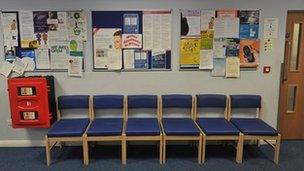Tackling missed appointments a 'top priority' for NHS
- Published

Missed appointments cost the NHS time and money
Reducing the number of patients not turning up for appointments with their GP is a "top priority," according to the head of the NHS in Wales.
Non-attendance is as high as 11% in some doctors' surgeries.
David Sissling told AMs a "major exercise" will look to better understand why patients do not turn up.
Rejecting sanctions, he said such patients were often vulnerable with complex problems or a "chaotic lifestyle".
NHS Wales chief executive Mr Sissling was giving evidence to the assembly's Public Accounts Committee (PAC).
He said health boards were trying to tackle the issue but he believed new systems, such as online bookings and text reminders, could help reduce the problem.
Mr Sissling said: "We should do a major exercise to better understand the 11%. Sometimes they are the most vulnerable, sometimes they have the greatest needs and sometimes they have chaotic lifestyles.
"I think adopting a blame culture would be inappropriate," Mr Sissling added.
AMs also questioned Welsh government officials about a promise to provide more GP appointments outside office hours.
Mr Sissling insisted 94% of surgeries offer appointments at least twice a week after "normal hours".
However, PAC chair Darren Millar criticised that record, claiming surgeries were not fulfilling their contract by not providing out of hours appointments more often.
He asked: "They are in breach of their contract ...why are we paying them? What on earth are the Welsh government doing about it?"
Mr Sissling said there had been a "very significant improvement" and that health boards needed to be "determined with their contracts."
Recently the British Medical Association (BMA) claimed family doctors in Wales faced a "crisis" and "enormous pressures" meant the profession was "on its knees".
In an interview with BBC Wales, Dr Charlotte Jones said increasing demand from patients coupled with a shrinking workforce meant GPs were often "too exhausted" to see patients out of hours.
She insisted the problems were particularly acute in rural areas.
"Unprecedented demand"
Mr Sissling told the committee he was aware that some areas of Wales were facing "particular challenges", but that the Welsh government was "taking action" to deal with the concerns.
Doctors representatives are currently negotiating with the Welsh government elements of a new GP contract, which will set out what family doctors are expected to deliver.
A Welsh government spokesperson recently suggested the new contract was likely to involve less bureaucracy, so GPs can spend more time with the most vulnerable patients.
Mr Sissling was giving evidence as part of a PAC investigation into "unscheduled care" in the NHS.
It is known that A&E departments last spring struggled to cope with what ministers called "unprecedented demand" from patients, including a large number of elderly people who were very ill or had complicated needs.
- Published15 November 2013
- Published18 September 2013
- Published18 July 2013